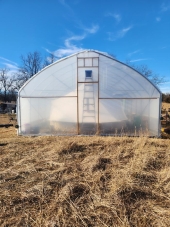My paddocks are my back yard, side yard, barn yard, south lot, and cafe garden. Or more properly, I should say that my 508c1a spiritual nonprofit's land is used this way. I live in the middle of Wichita, KS, zone 7a and have gradually acquired 3 residential lots and adjacent commercial cafe building and garden lot on the edge of the 'hood' which made it more affordable. In my retirement, I plan to homestead this sanctuary of almost 1 acre and have community gardening and homestead workshops to feed myself and others. I have 2 dwarf Nigerian goats and 3 farm yard hens that are enough for me and this land. I graded my lots to manage water and am planting food forest and fodder as my landscape. I've landscape gardened professionally for 25 years and it seems that to fit in, in town, it's important to add color to my yard, keep easement fodders low or try to mow high, and group plantings with obvious pathways.
For the goats and hens, I have fenced off beds of various fruits, berries, herbs, veggies and flowers and open the fenced beds for controlled grazing. What ever grows out of the fencing is free for the eating. I'm learning about planting grains along bed edges so the animals have winter feed and have learned that they love purple winter creeper euonymus which is growing all over the city that I can prune and bring home. It's said to be toxic but they show no ill signs and Hilda's weepy eye actually cleared up. Other winter green forages that I've noticed they also love are arbor vitae, pine, bamboo, dames rocket, liriope, hardy peas and brassicas, some clovers, iris and star of Bethlehem. I pick up bags of tree leaves for them as well as buying hay which I'm trying to learn to grow for standing hay. It's amazing to watch them eat certain things at certain times of the year that they won't touch any other time.
In spring I plan to plant sedan, sunflowers, and amaranth around the sunny south lot while the fruit trees and berries get added over time. They like green seed heads of milo too. I plant mostly for the goats but I've noticed that the chickens really like green Dutch white clover and Bermuda grass seeds. I'm using the self seeding trees to pollard at a little higher than goat height for fodder and screening around the property lines. They love mulberry, hackberry, pear, and the wild grape leaves.











